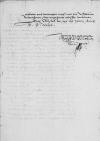 GStA PK, HBA, C1 No 653, 3r
GStA PK, HBA, C1 No 653, 3r
Durchlauchter, hochgeborner furst, hochgunstiger, lieber herre unnd freundt. / Unser freuntliche, willige dienst zuvoran. /
Es hat uns der erbar Nicolaus Glaubitz (Nickel Glaubitz) (†ca. 1551), Catholic priest converted to Lutheranism; protégé of Ioannes Dantiscus (in 1540); 1509 parish priest of St. Michael Church in Löbau (HARTMANN 1525-1550, No. 653, 656)⌊Nickell GlaubitzNicolaus Glaubitz (Nickel Glaubitz) (†ca. 1551), Catholic priest converted to Lutheranism; protégé of Ioannes Dantiscus (in 1540); 1509 parish priest of St. Michael Church in Löbau (HARTMANN 1525-1550, No. 653, 656)⌋ von Brzeg, town in Silesia, on the Oder river⌊BriegeBrzeg, town in Silesia, on the Oder river⌋, / der uns zum teil schwegerlich zugethan, / zum teil von guthen freunden commendirt, / durch sein hirÿnn vorwarte cf. Nicolaus GLAUBITZ to Ioannes DANTISCUS s.l., [1540-03], CIDTC IDL 4859⌊supplicationcf. Nicolaus GLAUBITZ to Ioannes DANTISCUS s.l., [1540-03], CIDTC IDL 4859⌋ / glaubhaftig bericht, / wie ehr sampt seiner schwester zu Gałdowo (Goldau), village in Ducal Prussia, 11 km NW from Iława, today in northern Poland⌊GoldawGałdowo (Goldau), village in Ducal Prussia, 11 km NW from Iława, today in northern Poland⌋ / bei E(wer) F(urstlichen) D(urchlauch)t von wegen etlicher ehegelobnis in vordechtlichen argwahn gefallen, / des er sich beÿ unss hochlich hat than entschuldigen, / dornebenn gantz vleissiglich inen an E(wer) F(urstliche) D(urchlauch)t zuvorschreiben und zuvorbitten angelangt unnd gebethen, / welchs wir yme guther wolmeÿnunge nicht haben wissenn zuwegern. / Ist demnach an E(wer) F(urstliche) D(urchlauch)t unser freuntlich bitten, / sie woltenn diesen Nicolaus Glaubitz (Nickel Glaubitz) (†ca. 1551), Catholic priest converted to Lutheranism; protégé of Ioannes Dantiscus (in 1540); 1509 parish priest of St. Michael Church in Löbau (HARTMANN 1525-1550, No. 653, 656)⌊jungen manNicolaus Glaubitz (Nickel Glaubitz) (†ca. 1551), Catholic priest converted to Lutheranism; protégé of Ioannes Dantiscus (in 1540); 1509 parish priest of St. Michael Church in Löbau (HARTMANN 1525-1550, No. 653, 656)⌋ unser fordrung unnd vorbitt gnediglich und erschieslich entpfinden, / inen auch sampt seiner schwester aus solchem vordechtnus und argwahn bei sich kommen / und solch sein ehr gelobnis gnediglich fur sich gehen / und zu vorhoffter endtschafft gelangen lassen, / auch hinfurbas, wie stets bisher, sein gnedigister herr(e) und landesfurst sein / unnd bleiben / und uns hirauff ire gunstige antwort bei zeiger dieses / zu zustellen sich nicht beschweren. / Das wollen wir im gleichen und grossern umb E(wer) F(urstliche) D(urchlauch)t freuntlich und nachbarlich beschuldenn, / ehr auch, der Nicolaus Glaubitz (Nickel Glaubitz) (†ca. 1551), Catholic priest converted to Lutheranism; protégé of Ioannes Dantiscus (in 1540); 1509 parish priest of St. Michael Church in Löbau (HARTMANN 1525-1550, No. 653, 656)⌊Nickel GlaubitzNicolaus Glaubitz (Nickel Glaubitz) (†ca. 1551), Catholic priest converted to Lutheranism; protégé of Ioannes Dantiscus (in 1540); 1509 parish priest of St. Michael Church in Löbau (HARTMANN 1525-1550, No. 653, 656)⌋, sampt seiner(r) schwester werdens in aller underthenigkeit ÿrem  GStA PK, HBA, C1 No 653, 3v erbieten und vormogen nach, / wie die getreuen underthanen, stets ungesparts vleisses vordienen. /
GStA PK, HBA, C1 No 653, 3v erbieten und vormogen nach, / wie die getreuen underthanen, stets ungesparts vleisses vordienen. /
 GStA PK, HBA, C1 No 653, 3v erbieten und vormogen nach, / wie die getreuen underthanen, stets ungesparts vleisses vordienen. /
GStA PK, HBA, C1 No 653, 3v erbieten und vormogen nach, / wie die getreuen underthanen, stets ungesparts vleisses vordienen. /



